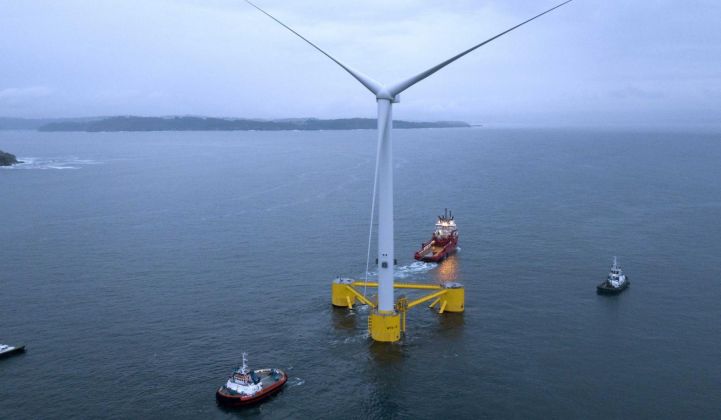France's Total announced two significant wind deals in recent days, becoming the latest oil company to push into floating offshore wind as it builds on its existing momentum in the solar market.
Total this week bought an 80 percent share of the 96-megawatt Erebus floating wind project in the Celtic Sea from developer Simply Blue Energy.
Then on Friday, the company confirmed its Total Quadran subsidiary had acquired developer Global Wind Power (GWP) France from its Danish parent, adding a 1-gigawatt portfolio of wind projects in France.
Fellow European oil majors Shell and BP have built-up gigawatt-scale renewables portfolios, but the pace of Total’s recent activity could see it outshine them both.
Total has 3 gigawatts of renewables within its 7-gigawatt portfolio of low-carbon projects. By 2040, the company aims to derive 15 to 20 percent of its revenue from its low-carbon business.
Earlier this year, Total bought a 50 percent share of Adani’s 2.1-gigawatt portfolio of operational solar assets in India for $510 million. In February, it signed two solar deals in Spain, including an outright acquisition of developer Solarbay’s 1.2-gigawatt development pipeline. And Total was part of the winning partnership in Qatar’s most-recent solar tender for an 800-megawatt project.
Floating offshore wind gains more momentum
The Erebus project off the coast of Wales will utilize floating foundations from Principle Power, the same technology used by the Engie- and EDP-led Windplus consortium. Windplus is behind the WindFloat Atlantic pilot off the coast of Portugal, which includes the world's largest floating turbine.
The Erebus project will be built in water depths of 70 meters. According to WindEurope, the average depth for offshore wind projects with fixed foundations is 33 meters. Being able to exploit greater depths also means more viable seabed and more gigawatts of deployment.
Expertise in subsea engineering developed by the North Sea oil industry has a number of overlaps with the technology and project management required for floating wind.
“Floating offshore wind is an extremely promising and technical segment where Total brings its extensive expertise in offshore operations and maintenance. Total has the appropriate skills to meet the technological and financial requirements that determine the success of future floating offshore developments,” Total CEO Patrick Pouyanné said in a statement.
Pouyanné's view is shared by many of Total’s peers in Europe's offshore oil industry. Equinor has led the way with the 30-megawatt Hywind Scotland project installed back in 2017. It is now developing the 88-megawatt Hywind Tampen site that will power two of the company’s North Sea drilling operations.
Shell acquired the offshore wind developer Eolfi last year. Repsol is a junior partner in the Windplus consortium.




